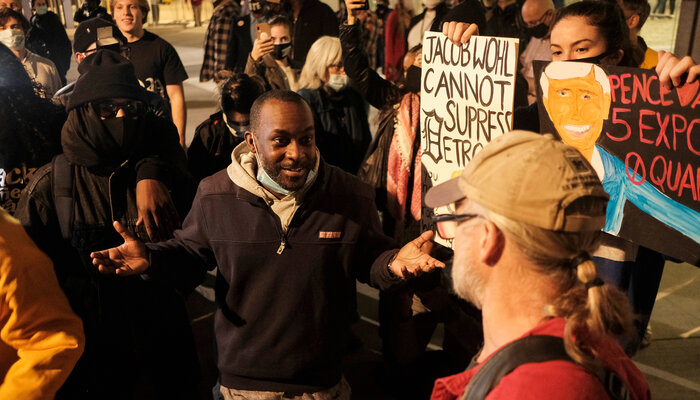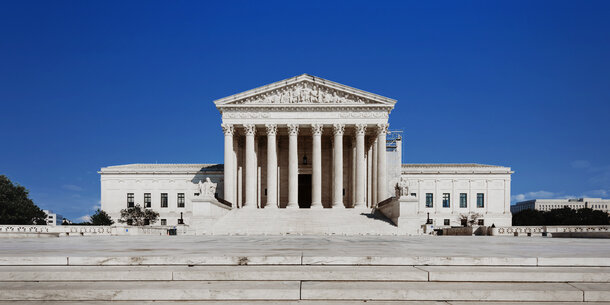Specific Safeguards Against Election Intimidation
In addition to the general safeguards against intimidation under federal and state law, many states have rules in place that provide additional protection against specific threats. State laws often regulate many of the actors involved in the election process — including poll watchers, election workers, and voter challengers — in ways that help reduce the risk of intimidation.
Intimidation by Poll Watchers
State laws provide specific limitations on poll watchers, thereby lessening the risk of misconduct or voter intimidation at the polls.
Most states limit who can serve as poll watchers and how many poll watchers may be present at any one polling location.In many states, poll watchers are limited to appointed representatives of a candidate or a party. Some states also permit neutral, nonpartisan observers at the polls. In Florida, North Carolina, and Pennsylvania, poll watchers must also be registered to vote in the county where they seek to observe the polls.
In addition to limiting who can serve as a poll watcher, most states have strict limits on what poll watchers can do. Some states, including Florida, Georgia, Nevada, and Texas, require poll watchers to wear a visible, official form of identification provided by election workers to ensure that only authorized watchers enter the voting area and remain accountable for their conduct.Some states, including Georgia, Florida, Nevada, and North Carolina, prohibit poll watchers from speaking to voters.And in all 10 of the high-risk states in this resource, poll workers have the authority to remove from the polling place poll watchers who abuse their roles.
Intimidation of Poll Workers and Election Officials
State and federal criminal law protect individuals against harassment, assault, and battery. Some states have taken steps to criminally prosecute attacks on election workers. The Michigan attorney general, for example, has publicly stated her intent to prosecute anyone who illegally threatens election officials. Other states have taken steps to protect election workers through legislation. For example, it is a felony in Georgia, New Hampshire, and Pennsylvania to interfere with a poll worker in performing their duties.
Challenges to Voter Eligibility at the Polls
As with all forms of voter intimidation, state and federal law prohibit voter challenges that are used to intimidate. Discriminatory challenges based on race, ethnicity, national origin, religion, or membership in a language-minority group are also illegal under federal and state law.Additionally, most states limit who is authorized to challenge another voter’s eligibility. In Arizona, Florida, Georgia, Nevada, New Hampshire, and North Carolina, for example, challengers must reside in the same precinct or county as a voter whose eligibility they wish to challenge.In Texas, only election officials are permitted to challenge voter eligibility at polling places.
Some states also have procedural safeguards in place to protect voters from challenges based on unreliable or incomplete information, such as requiring challenges to be made in writingor under oath.Other states require specific standards of proof to sustain a challenge to a voter’s eligibility.For example, Arizona requires clear and convincing evidence, meaning that a challenge cannot be affirmed unless a majority of the board is satisfied that the challenger has proven the voter’s ineligibility with highly probable or reasonably certain evidence.Georgia requires probable cause, meaning the county board of elections must find the existence of facts and circumstances that would create a reasonable belief that an accused person committed the act alleged.Moreover, in most circumstances, challenged voters must be allowed to cast a provisional ballot under federal and state law, which, if the voter’s eligibility is later confirmed, is counted the same as a regular ballot.
Coordinated Canvassing of Voters
Election deniers are engaging in widespread canvassing efforts in many states, both by phone and in person, questioning voters’ eligibility or past voting records to root out nonexistent fraud. To be clear, canvassing efforts that result in the intimidation of a voter or target voters based on race are illegal under federal and state law. Indeed, the Department of Justice sent a letter to the Arizona senate in 2021 specifically warning that a system of door-to-door canvassing to verify voter eligibility may constitute unlawful intimidation under federal law.
Additionally, canvassers who portray themselves as official actors may be in violation of other state laws as well. For example, in North Carolina, it is illegal to falsely “represent to any person that they are duly authorized employees of a county, a municipality or the State of North Carolina.”In Texas, it is illegal to impersonate a public servant with intent to induce another to rely on the person’s pretended acts.Similar prohibitions exist in many states, including Florida, Michigan, Nevada, Pennsylvania, and Wisconsin.
Vigilante-led canvassing may have even further-reaching effects than the intimidation of voters at their homes. Efforts designed to gather information on voters and build a record for mass voter challenges can be used as a method to disenfranchise eligible voters by seeking to remove voters from the rolls before an election. However, state and federal law protect voters from these attacks as well.
Mass voter challenges are subject to many of the same safeguards as are applicable to challenges generally, including, for example, requiring a challenger to reside in the same county and for a challenge to be based on personal knowledge.Other states have additional procedural safeguards regarding pre–Election Day challenges. North Carolina and Nevada, for example, only permit non–Election Day voter challenges to occur 25 days or more prior to the date of an election.
In addition, federal law provides procedural safeguards to prevent systematic purges of the voter rolls. For example, the National Voter Registration Act prohibits systematic removal of voters from the rolls on the grounds of change of residence within 90 days of a federal election,and in order to comply with federal due process requirements, challenged voters should receive notice and an opportunity to answer the grounds of the challenge.
Firearms at Polling Locations
As recently as June, the Supreme Court has made clear that states are free to restrict the possession of guns at polling places under the Second Amendment.Currently, at least 10 states expressly ban openly carrying guns at polling places, including Arizona, Florida, Georgia, and Texas.Other states prohibit carrying concealed weapons to the polls as well.As of 2020, over 40 percent of the voting-age population lives in a state that explicitly restricts guns at the polls. In addition, other states prohibit firearm possession at locations that are frequently used as polling places, such as in schools or government buildings. And local laws may provide additional regulations on firearm possession in some states. In any case, even in states that do not categorically prohibit firearms in all polling places, anyone who chooses to carry a firearm must still comply with federal and state law prohibiting voter intimidation. The Giffords Law Center to Prevent Gun Violence issued a detailed report in 2020 with a state-by-state analysis of the laws that prevent armed intimidation at polling places.
Aggressive Electioneering at Polling Locations
Supporters of a particular campaign or candidate may advocate for their preferred candidate in public, as permitted by law. However, that freedom is curtailed in and around polling locations to mitigate the potential for intimidation and harassment of prospective voters.
All states have electioneering laws that restrict the political activities one may engage in within polling places, often regulating what people can say, do, and wear at the polls in support of a candidate or campaign on the ballot. Many states prohibit electioneering within a buffer zone around a polling location, typically between 50 to 200 feet of the polling place entrance. For example, Florida, Georgia, Michigan, Nevada, Texas, and Wisconsin all restrict electioneering within 100 feet or less of the entrance to a polling place.Additionally, some states, such as New Hampshire, specifically prohibit individuals from wearing campaign-related apparel within a polling place.
These laws help limit potential harassment and intimidation voters may experience when trying to cast their ballots from anyone trying to influence their vote.
Voter Intimidation by Poll Workers
Poll workers, regardless of their partisan affiliation, must adhere to state election law. In each of our key states, poll workers undergo standardized training from the state or local elections office and are issued standardized handbooks outlining a poll worker’s rules and responsibilities.
Additionally, poll workers in Arizona, Florida, Georgia, Michigan, New Hampshire, North Carolina, Pennsylvania, Texas, and Wisconsin must take an oath of office to uphold state law when serving as poll workers.In Georgia and Pennsylvania, poll workers may not “vexatiously” delay voting.Poll workers who interfere with election processes or refuse to follow applicable law can also be removed or reassigned from their polling location.
For more information on poll workers, the Brennan Center recently published resources detailing the legal and procedural safeguards in key states to ensure poll workers’ compliance with state and federal law.
State and Local Law Enforcement
State and local law enforcement officers may have the right or duty to be at the polls for the purpose of helping election officials ensure a safe voting environment. They can be important partners in ensuring the safety of voters and election workers at the polls. If, for example, private citizens try to interfere with the right to vote, election workers may call in law enforcement to protect the public and ensure no one is deterred from voting.
However, voters may feel intimidated by the presence of law enforcement while voting and by recent state efforts directing law enforcement resources into the investigation and potential prosecution of election-related crimes.These new directives do not mandate law enforcement presence at polling locations in those states, nor do they change the procedures by which an eligible voter may cast a ballot or have that ballot counted.
Moreover, states have placed a variety of legal restrictions on state and local law enforcement to curtail the risk of voter intimidation. In some states, including Pennsylvania, officers who show up to the polls without being called there by election officials have committed a crime.In Arizona and Florida, law enforcement may not be inside a polling location unless responding to an emergency, voting, or with permission from poll workers, respectively.In various other states, including Florida, Nevada, North Carolina, and Wisconsin, officers at the polls must obey orders from election officials.And in North Carolina, in addition to the general federal and state restrictions on voter intimidation, state law specifically prohibits intimidation by a law enforcement officer.
In practice, election officials and law enforcement typically develop plans ahead of elections to ensure that voting processes will be orderly and fair, including through intrastate working groups coordinated by election officials, such as the Committee for Safe and Secure Elections, to plan for a variety of scenarios. The Georgetown Institution for Constitutional Advocacy and Protection and the Crime and Justice Institute issued a guidance document addressing how to prepare for and ensure public safety during elections.
• • •
While the specific threats of intimidation today may differ in important ways from those of past elections, laws are in place to address these shifting concerns. Intimidation or harassment of voters or election workers is illegal. In addition, there is a range of state laws and local policies that deter misconduct by private or official actors at the polls and beyond. These laws and policies act as safeguards for voters and election workers against intimidation.



